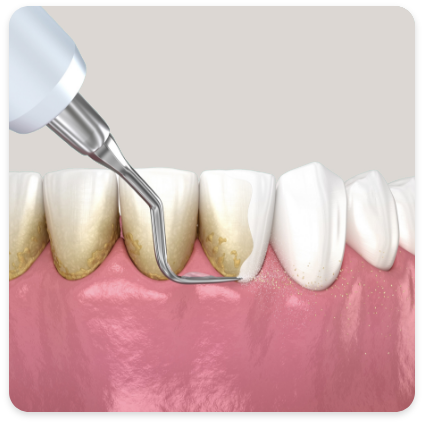Why is dental cleaning essential?
Plaque can form into tartar within 48 hours. Only your dental hygienist or dentist can remove these calcified deposits.
During regular dental checkups and cleanings, your dentist evaluates your mouth and checks for potential issues. Dental health problems are best corrected before they progress, damage your teeth and gums, and require complex treatments.
By committing to routine dental visits, you maintain a clean, healthy, and attractive smile. You can prevent stains from settling on tooth surfaces, slow down discoloration, and keep your smile bright.
What happens during dental hygiene cleaning?
Knowing what to expect during dental hygiene cleanings can help ease dental anxiety. Here are the basic components of routine dental appointments:
- Oral examination. This involves a visual examination of your mouth. Your dental hygienist uses instruments, such as a small mirror, to inspect your teeth and gums. Any irregularities are reported back to your dentist.
- X-Ray taking. A physical examination isn’t enough to identify and diagnose problems. Your dentist may require x-rays for further evaluation, especially if they suspect there may be issues.
- Plaque and tartar removal. Your dental hygienist uses a scaler to remove plaque and tartar buildup on your teeth. The more deposits there are in your mouth, the longer this process can go on. Let your dental team know if the sound or motion of the scaler makes you feel uneasy. They can work with you to make your visits more comfortable.
- Deep cleaning. After the debris on your teeth is removed, it’s time to deep clean the teeth. Your hygienist uses a high-powered brush and applies special toothpaste to clean and strengthen your enamel. They move forward to flossing areas in your mouth that are often missed.
- Fluoride application. Your hygienist may also apply fluoride to your teeth during routine dental hygiene visits. Extra fluoride is beneficial for those prone to plaque and tartar buildup. You need to avoid eating or drinking anything for a short period right after your treatment to allow maximum fluoride absorption.
The amount of deposit to be removed and oral health conditions vary per individual. That’s why the approaches used and the duration of dental cleaning procedures are different too.
How often should routine dental cleanings be done?
Routine dental cleanings are usually scheduled twice a year or every 6 months. If you’re more prone to developing dental problems, you may require them more often.
How often hygiene appointments are needed depends on the patient. At Little Italy Dentistry, we discuss these details during your visit.
When was your last dental cleaning in Little Italy, Toronto, Ontario?
When did you last see your dental hygienist for your routine hygiene cleaning?
If you’re looking to schedule your next dental visit in Little Italy, Toronto, ON, contact our dental office for assistance. We’re happy to arrange an initial consultation with the dentist for you and your family.
Little Italy Dentistry provides professional dental cleaning services to people of all ages. Let’s customize your home care routine so you can make the most of it and maintain your confident smile.







